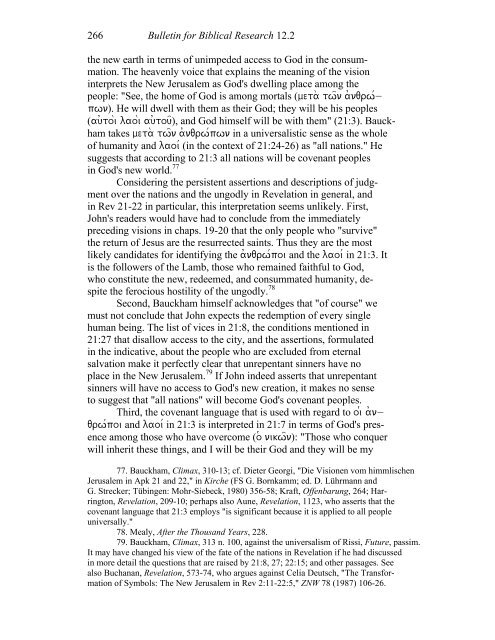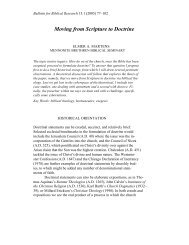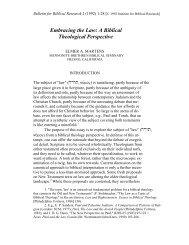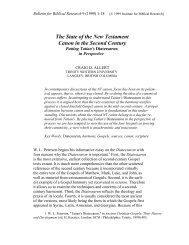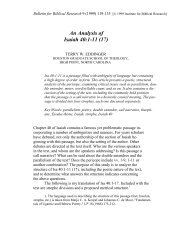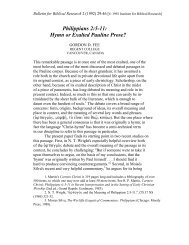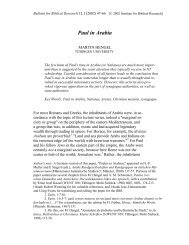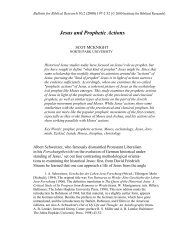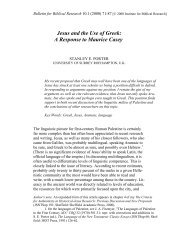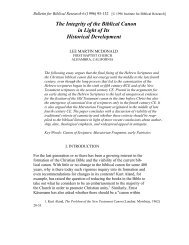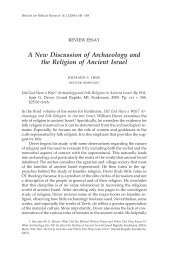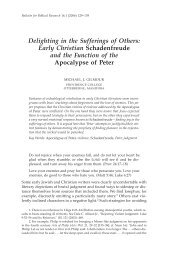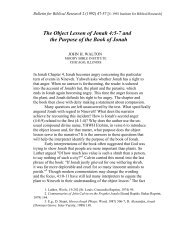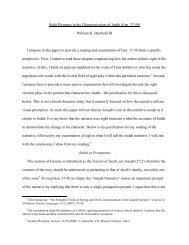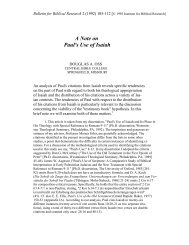John and the Future of the Nations - Institute for Biblical Research
John and the Future of the Nations - Institute for Biblical Research
John and the Future of the Nations - Institute for Biblical Research
Create successful ePaper yourself
Turn your PDF publications into a flip-book with our unique Google optimized e-Paper software.
266 Bulletin <strong>for</strong> <strong>Biblical</strong> <strong>Research</strong> 12.2<br />
<strong>the</strong> new earth in terms <strong>of</strong> unimpeded access to God in <strong>the</strong> consummation.<br />
The heavenly voice that explains <strong>the</strong> meaning <strong>of</strong> <strong>the</strong> vision<br />
interprets <strong>the</strong> New Jerusalem as God's dwelling place among <strong>the</strong><br />
people: "See, <strong>the</strong> home <strong>of</strong> God is among mortals (meta_ tw=n a)nqrw/-<br />
pwn). He will dwell with <strong>the</strong>m as <strong>the</strong>ir God; <strong>the</strong>y will be his peoples<br />
(au)toi_ laoi_ au)tou=), <strong>and</strong> God himself will be with <strong>the</strong>m" (21:3). Bauckham<br />
takes meta_ tw=n a)nqrw/pwn in a universalistic sense as <strong>the</strong> whole<br />
<strong>of</strong> humanity <strong>and</strong> laoi/ (in <strong>the</strong> context <strong>of</strong> 21:24-26) as "all nations." He<br />
suggests that according to 21:3 all nations will be covenant peoples<br />
in God's new world. 77<br />
Considering <strong>the</strong> persistent assertions <strong>and</strong> descriptions <strong>of</strong> judgment<br />
over <strong>the</strong> nations <strong>and</strong> <strong>the</strong> ungodly in Revelation in general, <strong>and</strong><br />
in Rev 21-22 in particular, this interpretation seems unlikely. First,<br />
<strong>John</strong>'s readers would have had to conclude from <strong>the</strong> immediately<br />
preceding visions in chaps. 19-20 that <strong>the</strong> only people who "survive"<br />
<strong>the</strong> return <strong>of</strong> Jesus are <strong>the</strong> resurrected saints. Thus <strong>the</strong>y are <strong>the</strong> most<br />
likely c<strong>and</strong>idates <strong>for</strong> identifying <strong>the</strong> a)nqrw/poi <strong>and</strong> <strong>the</strong> laoi/ in 21:3. It<br />
is <strong>the</strong> followers <strong>of</strong> <strong>the</strong> Lamb, those who remained faithful to God,<br />
who constitute <strong>the</strong> new, redeemed, <strong>and</strong> consummated humanity, despite<br />
<strong>the</strong> ferocious hostility <strong>of</strong> <strong>the</strong> ungodly. 78<br />
Second, Bauckham himself acknowledges that "<strong>of</strong> course" we<br />
must not conclude that <strong>John</strong> expects <strong>the</strong> redemption <strong>of</strong> every single<br />
human being. The list <strong>of</strong> vices in 21:8, <strong>the</strong> conditions mentioned in<br />
21:27 that disallow access to <strong>the</strong> city, <strong>and</strong> <strong>the</strong> assertions, <strong>for</strong>mulated<br />
in <strong>the</strong> indicative, about <strong>the</strong> people who are excluded from eternal<br />
salvation make it perfectly clear that unrepentant sinners have no<br />
place in <strong>the</strong> New Jerusalem. 79 If <strong>John</strong> indeed asserts that unrepentant<br />
sinners will have no access to God's new creation, it makes no sense<br />
to suggest that "all nations" will become God's covenant peoples.<br />
Third, <strong>the</strong> covenant language that is used with regard to oi( a)nqrw/poi<br />
<strong>and</strong> laoi/ in 21:3 is interpreted in 21:7 in terms <strong>of</strong> God's presence<br />
among those who have overcome (o( nikw=n): "Those who conquer<br />
will inherit <strong>the</strong>se things, <strong>and</strong> I will be <strong>the</strong>ir God <strong>and</strong> <strong>the</strong>y will be my<br />
77. Bauckham, Climax, 310-13; cf. Dieter Georgi, "Die Visionen vom himmlischen<br />
Jerusalem in Apk 21 <strong>and</strong> 22," in Kirche (FS G. Bornkamm; ed. D. Lührmann <strong>and</strong><br />
G. Strecker; Tübingen: Mohr-Siebeck, 1980) 356-58; Kraft, Offenbarung, 264; Harrington,<br />
Revelation, 209-10; perhaps also Aune, Revelation, 1123, who asserts that <strong>the</strong><br />
covenant language that 21:3 employs "is significant because it is applied to all people<br />
universally."<br />
78. Mealy, After <strong>the</strong> Thous<strong>and</strong> Years, 228.<br />
79. Bauckham, Climax, 313 n. 100, against <strong>the</strong> universalism <strong>of</strong> Rissi, <strong>Future</strong>, passim.<br />
It may have changed his view <strong>of</strong> <strong>the</strong> fate <strong>of</strong> <strong>the</strong> nations in Revelation if he had discussed<br />
in more detail <strong>the</strong> questions that are raised by 21:8, 27; 22:15; <strong>and</strong> o<strong>the</strong>r passages. See<br />
also Buchanan, Revelation, 573-74, who argues against Celia Deutsch, "The Trans<strong>for</strong>mation<br />
<strong>of</strong> Symbols: The New Jerusalem in Rev 2:11-22:5," ZNW 78 (1987) 106-26.


